by Calculated Risk on 12/07/2023 01:05:00 PM
Thursday, December 07, 2023
The "Home ATM" Mostly Closed in Q3
Today, in the Real Estate Newsletter: The "Home ATM" Mostly Closed in Q3
Excerpt:
During the housing bubble, many homeowners borrowed heavily against their perceived home equity - jokingly calling it the “Home ATM” - and this contributed to the subsequent housing bust, since so many homeowners had negative equity in their homes when house prices declined. Note: Very few homeowners have negative equity now - unlike during the housing bubble.There is much more in the article. You can subscribe at https://calculatedrisk.substack.com/.
...
Here is the quarterly increase in mortgage debt from the Federal Reserve’s Financial Accounts of the United States - Z.1 (sometimes called the Flow of Funds report) released today. In the mid ‘00s, there was a large increase in mortgage debt associated with the housing bubble.
In Q3 2023, mortgage debt increased $85 billion, down from $92 billion in Q2, and down from the cycle peak of $467 billion in Q2 2021. Note the almost 7 years of declining mortgage debt as distressed sales (foreclosures and short sales) wiped out a significant amount of debt.
However, some of this debt is being used to increase the housing stock (purchase new homes), so this isn’t all Mortgage Equity Withdrawal (MEW).
Fed's Flow of Funds: Household Net Worth Decreased $1.3 Trillion in Q3
by Calculated Risk on 12/07/2023 12:23:00 PM
The Federal Reserve released the Q3 2023 Flow of Funds report today: Financial Accounts of the United States.
The net worth of households and nonprofits fell to $151.0 trillion during the third quarter of 2023. The value of directly and indirectly held corporate equities decreased $1.7 trillion and the value of real estate increased $0.5 trillion.
...
Household debt increased 2.5 percent at an annual rate in the third quarter of 2023. Consumer credit grew at an annual rate of 1.1 percent, while mortgage debt (excluding charge-offs) grew at an annual rate of 2.5 percent.
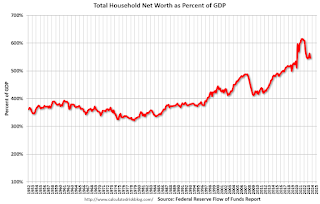 Click on graph for larger image.
Click on graph for larger image.The first graph shows Households and Nonprofit net worth as a percent of GDP.
 The second graph shows homeowner percent equity since 1952.
The second graph shows homeowner percent equity since 1952. Household percent equity (as measured by the Fed) collapsed when house prices fell sharply in 2007 and 2008.
In Q3 2023, household percent equity (of household real estate) was at 74.2% - up from 73.1% in Q2, 2023. This is close to the highest percent equity since the 1960s.
Note: This includes households with no mortgage debt.
 The third graph shows household real estate assets and mortgage debt as a percent of GDP.
The third graph shows household real estate assets and mortgage debt as a percent of GDP. Mortgage debt increased by $85 billion in Q3.
Mortgage debt is up $2.23 trillion from the peak during the housing bubble, but, as a percent of GDP is at 46.8% - down from Q2 - and down from a peak of 73.3% of GDP during the housing bust.
The value of real estate, as a percent of GDP, decreased in Q3 - but is below the peak in Q3 2022 - but is well above the average of the last 30 years.
Wholesale Used Car Prices Decreased 2.1% in November; Down 5.8% Year-over-year
by Calculated Risk on 12/07/2023 11:25:00 AM
From Manheim Consulting today: Wholesale Used-Vehicle Prices Decrease in November
Wholesale used-vehicle prices (on a mix, mileage, and seasonally adjusted basis) decreased 2.1% in November from October. The Manheim Used Vehicle Value Index (MUVVI) dropped to 205.0, down 5.8% from a year ago.
“While November’s decline was only slightly less than October’s, the move lower was on our radar, given the typical seasonal downward trend that paused in August and September,” said Chris Frey, senior manager of Economic and Industry Insights for Cox Automotive. “Prices still have a chance of rising slightly in December, though we’re not predicting an odd spike or trough. Rather, we’re expecting a measured movement through the end of the month and the year, which should get us close to the January forecast for a 4% year-over-year decline by December 2023. We’ll share our 2024 forecast during our January 8 call, but current views suggest less of a roller coaster in the new year.”
The seasonal adjustment reduced the November decrease. The non-adjusted price in November declined by 2.9% compared to October, moving the unadjusted average price down 7.5% year over year.
emphasis added
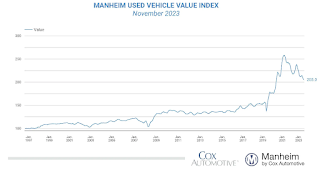 Click on graph for larger image.
Click on graph for larger image.This index from Manheim Consulting is based on all completed sales transactions at Manheim’s U.S. auctions.
Weekly Initial Unemployment Claims Increase to 220,000
by Calculated Risk on 12/07/2023 08:30:00 AM
The DOL reported:
In the week ending December 2, the advance figure for seasonally adjusted initial claims was 220,000, an increase of 1,000 from the previous week's revised level. The previous week's level was revised up by 1,000 from 218,000 to 219,000. The 4-week moving average was 220,750, an increase of 500 from the previous week's revised average. The previous week's average was revised up by 250 from 220,000 to 220,250.The following graph shows the 4-week moving average of weekly claims since 1971.
emphasis added
 Click on graph for larger image.
Click on graph for larger image.The dashed line on the graph is the current 4-week average. The four-week average of weekly unemployment claims increased to 220,750.
The previous week was revised up.
Weekly claims were slightly below the consensus forecast.
Wednesday, December 06, 2023
Thursday: Unemployment Claims, Q3 Flow of Funds
by Calculated Risk on 12/06/2023 07:28:00 PM
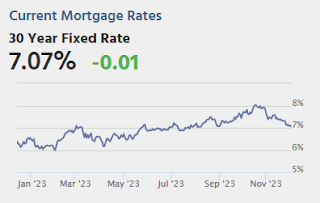
Thursday:
• At 8:30 AM ET, The initial weekly unemployment claims report will be released. The consensus is for 224 thousand, up from 218 thousand last week.
• 12:00 PM, Q3 Flow of Funds Accounts of the United States from the Federal Reserve.
Heavy Truck Sales Increased in November, up 5% YoY
by Calculated Risk on 12/06/2023 03:45:00 PM
This graph shows heavy truck sales since 1967 using data from the BEA. The dashed line is the November 2023 seasonally adjusted annual sales rate (SAAR).
Heavy truck sales really collapsed during the great recession, falling to a low of 180 thousand SAAR in May 2009. Then heavy truck sales increased to a new record high of 570 thousand SAAR in April 2019.
 Click on graph for larger image.
Click on graph for larger image.Note: "Heavy trucks - trucks more than 14,000 pounds gross vehicle weight."
Heavy truck sales declined sharply at the beginning of the pandemic, falling to a low of 308 thousand SAAR in May 2020.
As I noted last Friday, Vehicles Sales decrease to 15.32 million SAAR in November; Up 7% YoY
 The second graph shows light vehicle sales since the BEA started keeping data in 1967. Vehicle sales were at 15.32 million SAAR in November, down from 15.44 million in October, and up 6% from 14.27 million in November 2022.
The second graph shows light vehicle sales since the BEA started keeping data in 1967. Vehicle sales were at 15.32 million SAAR in November, down from 15.44 million in October, and up 6% from 14.27 million in November 2022.1st Look at Local Housing Markets in November with Comparison to 2019
by Calculated Risk on 12/06/2023 01:31:00 PM
Today, in the Calculated Risk Real Estate Newsletter: 1st Look at Local Housing Markets in November with Comparison to 2019
A brief excerpt:
NOTE: The tables for active listings, new listings and closed sales all include a comparison to November 2019 for each local market (some 2019 data is not available).There is much more in the article. You can subscribe at https://calculatedrisk.substack.com/
This is the first look at several early reporting local markets in November. I’m tracking about 40 local housing markets in the US. Some of the 40 markets are states, and some are metropolitan areas. I’ll update these tables throughout the month as additional data is released.
Closed sales in November were mostly for contracts signed in September and October. Since 30-year fixed mortgage rates were in the 7.2% in September, and 7.6% in October, compared to the mid-6% range the previous year, closed sales were down year-over-year in November.
...
Here is a summary of active listings for these early reporting housing markets in November.
There are significant regional differences when comparing to 2019 levels. For example, inventory is up in San Diego compared to November 2019, and down sharply in Las Vegas.
Inventory for these markets were down 10.9% YoY in November and are now down 4.5% YoY.
...
This was just several early reporting markets. Many more local markets to come!
Trade Deficit increased to $64.3 Billion in October
by Calculated Risk on 12/06/2023 08:30:00 AM
The Census Bureau and the Bureau of Economic Analysis reported:
The U.S. Census Bureau and the U.S. Bureau of Economic Analysis announced today that the goods and services deficit was $64.3 billion in October, up $3.1 billion from $61.2 billion in September, revised
October exports were $258.8 billion, $2.6 billion less than September exports. October imports were $323.0 billion, $0.5 billion more than September imports.
emphasis added
 Click on graph for larger image.
Click on graph for larger image.Exports decreased and imports increased in October.
Exports are up 1% year-over-year; imports are down 3% year-over-year.
Both imports and exports decreased sharply due to COVID-19 and then bounced back - and imports had been decreasing and exports moving sideways recently.
The second graph shows the U.S. trade deficit, with and without petroleum.
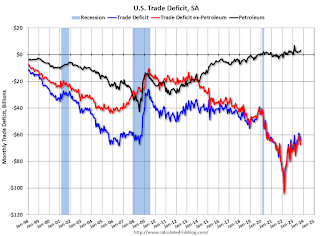 The blue line is the total deficit, and the black line is the petroleum deficit, and the red line is the trade deficit ex-petroleum products.
The blue line is the total deficit, and the black line is the petroleum deficit, and the red line is the trade deficit ex-petroleum products.Note that net, exports of petroleum products are positive and have been increasing.
The trade deficit with China decreased to $25.5 billion from $28.8 billion a year ago.
ADP: Private Employment Increased 103,000 in November
by Calculated Risk on 12/06/2023 08:15:00 AM
Private sector employment increased by 103,000 jobs in November and annual pay was up 5.6 percent year-over-year, according to the November ADP® National Employment ReportTM produced by the ADP Research Institute® in collaboration with the Stanford Digital Economy Lab (“Stanford Lab”). T The ADP National Employment Report is an independent measure and high-frequency view of the private-sector labor market based on actual, anonymized payroll data of more than 25 million U.S. employees.This was below the consensus forecast of 120,000. The BLS report will be released Friday, and the consensus is for 200 thousand non-farm payroll jobs added in November.
...
“Restaurants and hotels were the biggest job creators during the post-pandemic recovery,” said Nela Richardson, chief economist, ADP. “But that boost is behind us, and the return to trend in leisure and hospitality suggests the economy as a whole will see more moderate hiring and wage growth in 2024.”
emphasis added
MBA: Mortgage Applications Increased in Weekly Survey
by Calculated Risk on 12/06/2023 07:00:00 AM
From the MBA: Mortgage Applications Increase in Latest MBA Weekly Survey
Mortgage applications increased 2.8 percent from one week earlier, according to data from the Mortgage Bankers Association’s (MBA) Weekly Mortgage Applications Survey for the week ending December 1, 2023. Last week’s results include an adjustment for the observance of the Thanksgiving holiday.
The Market Composite Index, a measure of mortgage loan application volume, increased 2.8 percent on a seasonally adjusted basis from one week earlier. On an unadjusted basis, the Index increased 43 percent compared with the previous week. The Refinance Index increased 14 percent from the previous week and was 10 percent higher than the same week one year ago. The seasonally adjusted Purchase Index decreased 0.3 percent from one week earlier. The unadjusted Purchase Index increased 35 percent compared with the previous week and was 17 percent lower than the same week one year ago.
“Mortgage rates declined last week, with the 30-year fixed-rate mortgage falling to 7.17 percent – the lowest level since August 2023. Slower inflation and financial markets anticipating the potential end of the Fed’s hiking cycle are both behind the recent decline in rates,” said Joel Kan, MBA’s Vice President and Deputy Chief Economist. “Refinance applications saw the strongest week in two months and increased on a year-over-year basis for the second consecutive week for the first time since late 2021. The overall level of refinance applications is still very low, but recent increases could signal that 2023 was the low point in this cycle for refinance activity, consistent with our originations forecast. Purchase applications remained 17 percent lower than a year ago, held back by low inventory and still-challenging affordability conditions.”
...
The average contract interest rate for 30-year fixed-rate mortgages with conforming loan balances ($726,200 or less) decreased to 7.17 percent from 7.37 percent, with points decreasing to 0.60 from 0.64 (including the origination fee) for 80 percent loan-to-value ratio (LTV) loans.
emphasis added
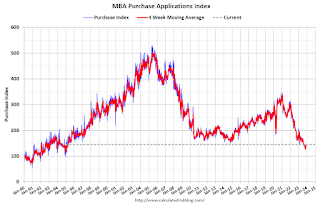 Click on graph for larger image.
Click on graph for larger image.The first graph shows the MBA mortgage purchase index.
According to the MBA, purchase activity is down 17% year-over-year unadjusted.



